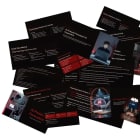Learn Anything in 72 Hours Using AI. Here's the Exact System
A proven framework for compressing weeks of learning into focused sprints that actually stick
Human brains aren’t built for the way information exists online now.
A brandable Workshop Kit is available for this article. Not yet a Coach-level Subscriber? Find out about the Workshops…
Hey there, 👋
The AI Research Sprint: Build Deep Expertise Fast
Ever spend three hours researching a topic only to end up with 47 open browser tabs and no clear takeaway? Yeah, me too.
But building expertise doesn’t have to feel like drowning in information anymore. AI can compress weeks of research into focused sprints that actually stick. Not the shallow “I skimmed a few articles” kind of knowledge, but the deep understanding that makes you sound like you’ve been studying this stuff for months.
In this article, you’ll discover:
Why traditional research methods waste 60% of your time on irrelevant information
The exact framework for turning AI into your research co-pilot
How to build legitimate expertise in any topic within 2-3 focused days
The Research Trap
Most people approach learning a new topic the same way they did in school. Google search. Open 15 tabs. Read article 1, then article 2, then forget what article 1 said. Bookmark “for later” (spoiler: you never look at it again).
The problem isn’t your focus or intelligence. It’s that human brains aren’t built for the way information exists online now. We’re pattern-matching machines, but we need the patterns organized for us first.
Traditional research asks you to be both the janitor AND the architect. You’re supposed to clean up messy information while simultaneously building a coherent knowledge structure. That’s like asking someone to frame a house while also manufacturing the lumber.
Why Speed Actually Creates Better Learning
There’s a counterintuitive truth about expertise: the faster you can compress the learning loop, the better you retain it. Not because rushed learning is superior, but because momentum creates context.
When you research something over three weeks, grabbing bits here and there, your brain treats each session as a separate event. There’s no narrative thread. But when you do a focused sprin, everything connects. You’re building a knowledge map in real-time, and each new piece of information slots into place because the foundation is fresh.
AI doesn’t just speed this up, it transforms how the process works entirely.
The Basic Framework: Three Phases That Work
Here’s a simple approach that’ll get you 80% of the way there without any fancy prompts.
Phase 1: The Foundation Sweep
Start by asking AI to give you the landscape. Not details yet, just the terrain.
Basic prompt: “Explain [topic] like I’m smart but completely new to this. Include the key concepts, major schools of thought, and common misconceptions.”
This gives you a mental scaffolding. You’re not trying to memorize anything yet, just understanding where the boundaries are.
Phase 2: The Deep Dive Questions
Now that you know the landscape, identify the 3-5 most important concepts. For each one, go deeper.
Ask things like:
“What are the practical applications of [concept]?”
“What do experts argue about regarding [concept]?”
“What would a beginner get wrong about [concept]?”
These questions force the AI to give you nuanced understanding, not just surface definitions.
Phase 3: The Application Test
This is where most people stop too early. Reading about something isn’t the same as understanding it.
Try: “Give me a scenario where I’d need to apply [topic]. Walk me through how an expert would approach it versus how a beginner would.”
This cements the knowledge because you’re seeing it in action.
Common Mistakes That Kill Your Research Sprint
Mistake 1: Trying to Learn Everything
You don’t need to become the world’s foremost expert. You need to understand enough to be dangerous in your specific context. Focus on applied knowledge, not encyclopedic coverage.
Mistake 2: Not Taking Notes
Your future self will hate you if you don’t document this. Even basic bullet points help. The AI can regenerate information, but it can’t recreate your specific insights and connections.
Mistake 3: Skipping the Application Phase
Reading about something and being able to use it are completely different skills. Always test your understanding by applying it to a real scenario, even a hypothetical one.
What’s Next?
Everything above will absolutely work and help you research faster. But if you want the actual prompts, frameworks, and systems that turn this from “pretty good” into “professional grade,” that’s what the next section delivers.
You’ll get:
The complete AI Research Sprint template with exact prompts for each phase
Advanced questioning frameworks that extract expert-level insights
The synthesis prompt system that connects disparate information into coherent mental models
Industry-specific adaptations for technical topics, creative fields, and business strategy
Conversation examples showing exactly how to iterate and dig deeper
Time-saving shortcuts for when you need to sprint even faster
This is the difference between knowing the theory and having the actual tools in your hands, ready to use today.

